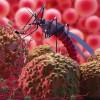
 IJCP Editorial Team
IJCP Editorial Team
Signs of Post Traumatic Stress Disorder
Mental health awareness is essential for all. Addressing mental health issues, having open and honest discussions about mental health, and seeking medical attention when necessary are important.
Post-Traumatic Stress Disorder (PTSD) is a mental health condition that can be triggered by a traumatic event, leaving lasting effects of fear and negativity. It was previously associated mainly with war veterans, but studies have shown that PTSD can affect people of all ages. Neurologically, PTSD can lead to structural and chemical changes in the brain, such as a smaller hippocampus and an overactive amygdala, which affect memory, emotion regulation, and fear processing. This can result in anxiety, depression, overexcitability, nightmares, flashbacks, irritability, difficulty concentrating, and trouble sleeping. Individuals with PTSD may have the following:
o Vivid memories of the traumatic event and a desire to relive them. They may also try to avoid trauma reminders and experience negative emotions like sadness, anger, guilt, and shame.
o Physical symptoms such as headaches, stomach aches, and general aches and pains can also be present.
Seeking professional help from mental health professionals is crucial when experiencing such signs and symptoms. They can provide support, assist in managing the condition, and help individuals learn to cope. It's important to remember that seeking help for mental issues is a sign of strength.

IJCP Editorial Team
Comprising seasoned professionals and experts from the medical field, the IJCP editorial team is dedicated to delivering timely and accurate content and thriving to provide attention-grabbing information for the readers. What sets them apart are their diverse expertise, spanning academia, research, and clinical practice, and their dedication to upholding the highest standards of quality and integrity. With a wealth of experience and a commitment to excellence, the IJCP editorial team strives to provide valuable perspectives, the latest trends, and in-depth analyses across various medical domains, all in a way that keeps you interested and engaged.















Please login to comment on this article